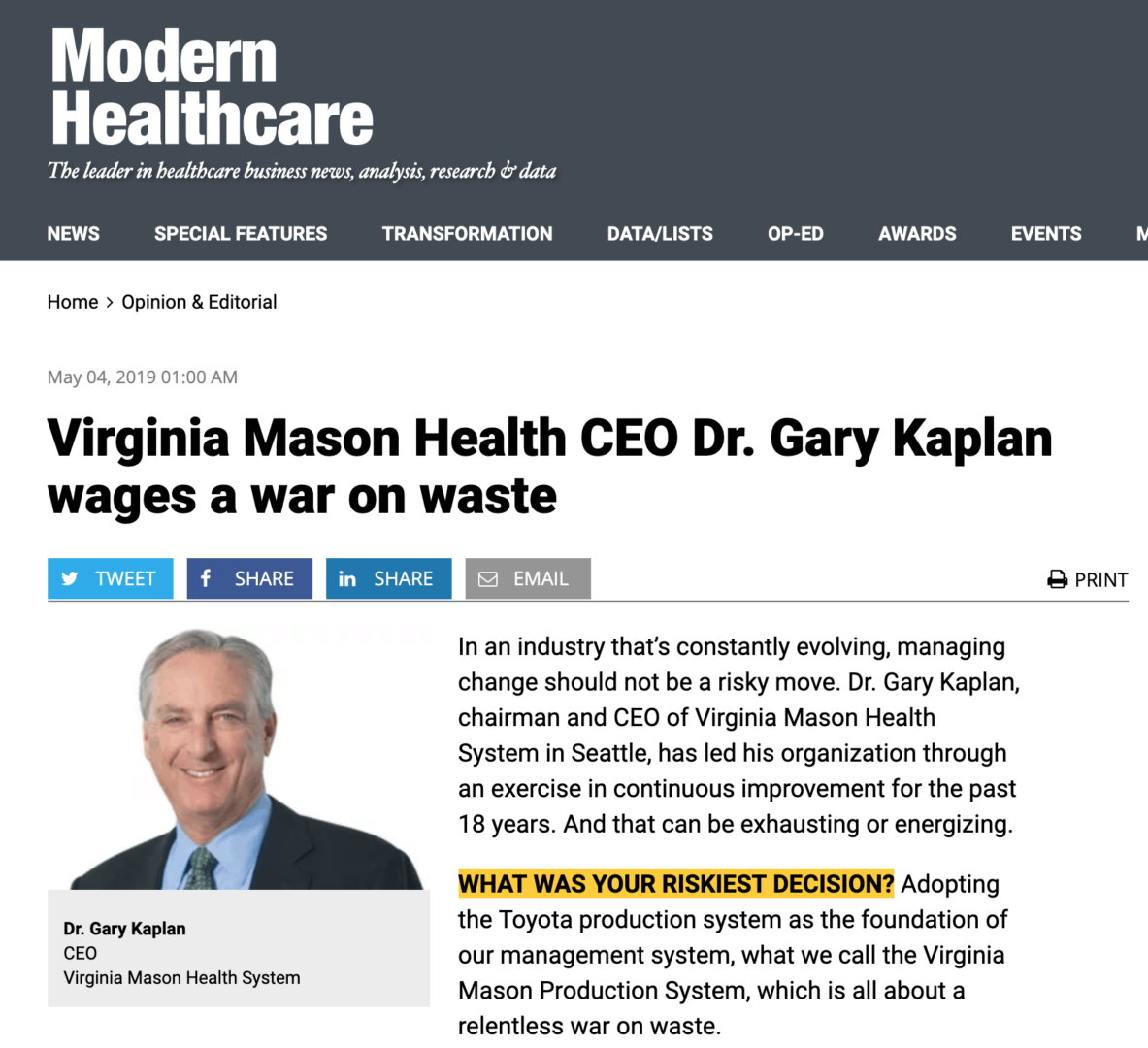A few of you sent me this article from Modern Healthcare (thanks!):
Virginia Mason Health CEO Dr. Gary Kaplan wages a war on waste

As you can see in the screen shot of the start of the article, Dr. Kaplan says, “Adopting the Toyota production system” was the “riskiest decision” of his career.
I think calling it the “Virginia Mason Production System” was risky, but it seems to have worked for them. Alternatives, based on other organizations in healthcare, could have been the “Virginia Mason Improvement System” or the “Virginia Mason Improving Care System.” It's all a mouthful.
He also said TPS or Lean is:
“…all about a relentless war on waste.”
I don't know if it's quite literally all about waste. Sometimes, we need to focus on maximizing the “value-added” activity for the patient. We can focus on doing more of what the patient needs… well, I guess reducing waste is a great way to free up time to add more value.
This all does have to be relentless, I agree. We should be “practicing Lean” not implementing it and being done. We can't give up when things get difficult in our transformation efforts.
Modern Healthcare asks him, “Why was that risky?”
Kaplan says it was “unheard of” to look at a manufacturing management system as a model. It pretty rare in 2001. Arguably, some Detroit-area hospitals and Seattle Children's were exploring this in the late 1990s.
Kaplan adds:
“There were people talking about principles of (W. Edwards) Deming back then…”
There are fewer people talking about Deming, now… but there are some (and Deming is a huge influence on my book Measures of Success).
He adds:
“I remember Paul O'Neill (the former Treasury secretary and Alcoa CEO who became active in the Institute for Healthcare Improvement) saying, “Virginia Mason is engaged in a bet-the-farm strategy on quality.” He knew at that time that we were embracing this management system because of what it meant to quality and safety, which was what it was really all about.”
I agree that Lean and TPS are first and foremost about quality and safety, and that's why the subtitle of my book Lean Hospitals is “Improving Quality, Patient Safety, and Employee Engagement.” Everything else, including flow and cost, follows as an end result.
Listen to my podcast with Mr. O'Neill about all of this:
I'm honored to be involved with Mr. O'Neill's firm, Value Capture.
I agree with Kaplan's quote:
“Culture change involves everybody, but it has to start at the top. Leaders by their own behavior help to drive culture.”
Kaplan says, maybe surprisingly, “I don't want to come across as saying we've figured out how to ease the workload, because healthcare today is a lot about drinking from the fire hose.” I thought Virginia Mason had previously been able to increase nurse time at the bedside from about 30% to about 80% by reducing waste and improving processes. It was actually from 35% to 78%, per this article of theirs.
I wonder how much the introduction of Electronic Health Record (EHR) systems have affected that?
Other highlights of his management style:
- He works hard on communication
- Transparency is important
- He's there to hear report outs on improvement
- He's inclusive and engaged
- He's patient-driven
He concludes by saying, “…it requires a lot of willingness to embrace adaptive change, to engage in humble inquiry, to care about the loss that people feel as the industry and professions evolve.”
I'm glad that Kaplan is sharing these perspectives and is leading by example… we need more of this in healthcare.
Oh, and here's an article from 2018 where he talks about more than waste.
“We feel a moral imperative to strive harder and harder on patient experience and ensure the highest quality, safest care. We think the pathway to higher quality, safer care can be the same pathway to lower cost.”
How are they simultaneously lowering costs and improving care?
” It's really about applying the systems engineering approach to care delivery. We call our approach the Virginia Mason Production System. We use Lean tools, but today, almost 17 years later–we've been doing it longer than anyone in the world in healthcare–it is continuing to drive breakthroughs in quality, safety and lowering cost.”
I wonder why they didn't call it the “Virginia Mason Management System” since it's not just about tools?
Or the “Virginia Mason Excellence System”?
It's not just about doing things the way we do it today, but with a bit less waste… we have to sometimes stop doing things.
“All of that has to be modified by appropriateness. We could do a great procedure with a great outcome, delight the patient and family with great experience, do it efficiently with no waste, but if the patient didn't need it, there's no value there.”
Doing a surgery that isn't really necessary is certainly a form of waste. Reducing waste, improving value… two sides of the same coin.
Please scroll down (or click) to post a comment. Connect with me on LinkedIn.
Let’s work together to build a culture of continuous improvement and psychological safety. If you're a leader looking to create lasting change—not just projects—I help organizations:
- Engage people at all levels in sustainable improvement
- Shift from fear of mistakes to learning from them
- Apply Lean thinking in practical, people-centered ways
Interested in coaching or a keynote talk? Let’s start a conversation.









![When Was the Last Time a Leader Around You Admitted They Were Wrong? [Poll]](https://www.leanblog.org/wp-content/uploads/2025/07/Lean-Blog-Post-Cover-Image-2025-07-01T212509.843-100x75.jpg)